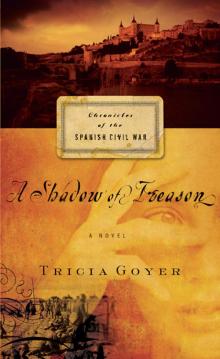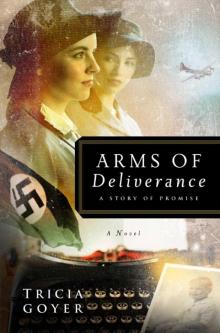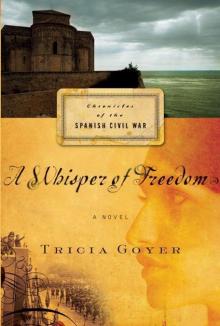- Home
- Tricia N. Goyer
Valley of Betrayal Page 11
Valley of Betrayal Read online
Page 11
Armando nodded and then crossed his arms over his chest, casting Manuel a boyish grin. "Sí, you are correct. I just wonder how the troublemaking mutiko I knew has become so wise. I am thankful, as are the others, for you to guide us."
"Only the Lord grants wisdom, and you must realize I ask for it plenty."
He gazed at the distant mountain, his brow furrowing at the thought of the war crossing over it into their land. Needing to talk to someone, Father Manuel lowered his guard to confess what he hadn't dared speak aloud.
"We are in God's hands, and He will dispose of us as He wills. Yet if we must die, then now is the time to prepare our hearts. But I fear it is in the living where the battle truly is." He lowered his voice as he peered into his friend's eyes. "My only comfort is that God, whose eye is on the sparrow, watches over us all."
Even as Father Manuel spoke the words, Armando shifted in his chair and tapped his foot against the patio stones. Maybe Armando was uneasy at the talk of death, of war. It was that way with this people. For they somehow believed if it wasn't discussed, such things would not come to pass.
"Yes, well, I must go. Nerea has dinner." With a quick embrace, Armando patted his back and left.
As he watched Armando amble down the road, Father Manuel clasped his hands under his wide sleeves, as if in prayer. Yet his thoughts refused to still. Fear filled his mind. Worry that he would not stand in time of trial, or be able to offer hope to the people who looked to him for guidance. At times like this he questioned the call. Surely God could use another—someone more capable.
Dedicating one's life to serving a God of love was easy. Yet God's people? They were another matter entirely. Their needs overwhelmed him, and he only prayed that one day he could help to meet them in even the smallest manner.
Father Manuel dropped to his knees, as if the heaviness of his heart weighed him down too much to stand. "Lord, make me an instrument of Thy Peace. Where there is hatred, let me sow love. Where there is injury, pardon. Where there is discord, unity. Where there is despair, hope."
He continued the prayer as an utterance of his breath, then lifted his voice as his shoulders trembled under the impact of the prayer's final words. "It is in the forgetting oneself that one finds oneself. It is in the forgiving that one obtains forgiveness. It is in dying that one is resurrected to eternal life. Amen."
Chapter Thirteen
JULY 31, 1936
Viel Feind, viel Ehr
Many enemies, much honor.
German proverb
Below the sea-sprayed deck a cot awaited him, yet Ritter knew he wouldn't be able to sleep. For days the idea of war had echoed as a distant dream. Now, as the SS Usaramo slipped out of Hamburg with eighty-five German flyers and ground crew, the idea had become reality.
He ran his fingers through his hair, then slipped his hands deep into the pockets of his civilian trousers, leaning back against the cabin wall for support.
A half-smirk, half-smile broke through his calm demeanor as Maj. Gen. Hugo Sperrle, a veteran of the Great War, who had fought in Africa and also in the South American Chaco War, strolled by with a young woman at his side. To any outsider, the officer appeared to be a doting father on vacation. Of course, appearances could be deceiving.
Ritter had arrived at the docks ahead of schedule to watch as dockworkers loaded hundreds of crates with SEVILLE stamped on their sides into the hold and onto the deck. Inside the crates, components of Ju.52 bombers and Heinkel He.51 fighter planes hid, ready to be assembled on Spanish soil.
Turning up the collar of his jacket against the cold ocean spray, he imagined other Ju.52s, commandeered from Lufthansa, being shuttled to Morocco or to a Nationalist-controlled Seville to start the airlift of troops from Africa into Spain. With his uncle's influence, Ritter knew he could have joined the bomber crews, but he'd requested the He.51 fighters instead. One man. One machine. Solo glory.
Posing as an ersatz tour group, other pilots gathered on the crowded deck. They spoke little, lest they reveal their cover. Yet, glancing around even in the moonlight, Ritter noted anticipation on their faces.
Above him the stars shone brightly in a pale sky. He looked into the horizon, knowing that by tomorrow the sky above him would be the Spanish firmament he would fly above on his "volunteer" mission. Ritter only hoped the adventure, the status, and Isanna's excitement would hold out. It was because of her he'd ventured beyond the German border in the first place—resigning his commission, being classified officially as a reserve, and exchanging his uniform for civilian clothing—all of which were required for travel to Spain.
A young pilot Ritter recognized from training approached, his light brown hair blowing in the wind.
"Magic Fire." Ritter patted the side of one of the crates, ensuring his voice was low enough for only the pilot to hear. "Hard to believe this box will allow us to soar over Spain in a few days."
"It's about time." The kid grinned, and his youthful face and easygoing manner reminded Ritter of the popular student in school who always hogged the center of attention, making everyone laugh. In fact, Ritter felt his guard fall as he stood in the kid's presence.
"The world may have kept Germany from building an army for the last twenty years, but no peace treaty could remove the inner warrior." He lifted his finger as if shooting at a passing airplane, then extended his hand. "I'm Eduard, by the way. That was some send-off they gave us, wasn't it?"
With a smile Ritter thought back to his last day in Berlin, where civilians greeted the Wehrmacht's arrival with signs of joyous celebration. Their steel-helmeted battalions marched through crowds, who surged into the streets to greet them. As each rank passed, they had snapped their heads smartly to the right—on command—to face Hitler.
Eduard hummed the song they had sung with vigor.
"Our enemies are the Reds, the Bolsheviks of the world!" Ritter mouthed to the tune.
Eduard placed a hand over his heart. "I thought I'd found paradise. Young frauleins handing me those red carnations. Dancing, cheering, singing patriotic anthems. I don't know about you, but I felt like we were the display of strength and skill everyone's hoped for all along."
"You sound like a dreamer, Eduard. Are you sure you can fly?"
"And you sound like you didn't get quite as many kisses as you'd hoped for. . . . Are you jealous, old man?"
"Not at all. I've discovered in my years that the love of one woman—true, dedicated love—exceeds that of a hundred admirers." He recalled the look on Isanna's face as she spotted him among the other uniformed men. She'd waved her arms wildly, throwing kisses his direction. And after the ceremony, as they returned to his uncle's house together, her passionate excitement over his Spanish adventure made it all worth it.
"Good point. Yet, truthfully, the knowledge of the war awaiting brought me as much of a thrill as the women. What boy hasn't played with swords and tanks, or imagined himself in dogfights in the sky? I can't wait to get up there."
Eduard's wide smile was contagious, and a chuckle escaped Ritter's lips.
"So, you leaving anyone special behind?" Ritter gripped his hands on the rail as the sway of the ship increased, evidence of their movement into deeper waters.
"My wife and two sons . . ." Eduard sighed.
Ritter frowned.
"Just kidding! No woman pining over me, unless you count my mother. She's just sure I'll never come home, but I reminded her that our country's military freedom and national honor are at stake."
Ritter placed a hand on Eduard's shoulder. "More nice words, but what you're really saying is you like flying those planes."
A twinkle lit Eduard's eye. "Yeah, and I'll like it even more if I can shoot down some Reds."
Ritter nodded, then looked to the open sea as Hamburg disappeared in the distance. "You heading down to the bunks?"
"Nah, I was waiting to spot the naval escorts—not something one sees every day."
"Good, I'll wait with you. That was my plan too." Ritter crossed his
arms over his chest. "I've always wanted to see what one of those big ships looks like. It will somehow make this whole business real. Until I can claim my own kill, that is."
Sophie took a deep breath as she followed Benita through the streets toward the school. With donations from a few of José's artist friends, Sophie carried a small wooden box filled with paints, scraps of paper, and brushes. She focused on the wide black braid that swung like a pendulum on Benita's back.
Sophie swore that despite her round shape, Benita moved with the elegance of a queen. She even carried the loaves of bread she’d baked on a tray like one carrying a crown for coronation. And she hummed as she walked—some quick, Spanish tune that Sophie knew she'd heard before.
It had only been one day since Michael left, and she missed him already. They hadn't talked much after she'd arrived back at the apartment with her things. He'd said good-bye with a quick kiss and news that he’d be out of town for a week covering the front.
"Will you be okay?" he'd asked, running his hand down her cheek. Her chest had filled with warmth, and a sweet peace had settled over her.
"I'll be fine." She pointed to Benita and Luis. "Do you think these two will let anything happen to me?"
It was true that she found strength in their presence, but it was more than that. The shooting of the two militiamen had the opposite effect from what Sophie had anticipated. Sitting around the small wooden table with her hosts that evening, she realized life was fleeting. Resolve replaced the fear that had pounced on her—goring into her as if with a bull's horns. She also had a determination not to let the unknown scare her into living in a dark hole, afraid to step outside the apartment. To give in and run away would be the same as letting the enemy win.
And as she strode along behind Benita, Sophie wondered if the matadors felt the same empowerment when they faced death in the arena. Did their face-off with their own weak humanity make them understand the joy of truly living?
They reached the school, and Benita directed her inside to the first room on the right. Then Benita stopped a woman in the hall, rattling off the story of yesterday's events, and only slightly embellishing José's injury and the damage to her apartment.
Sophie strode into the room without her. A dozen children sat in a circle, waiting. She pulled up a chair and sat before them, setting her box to the side. "Hola, children."
"Hola, Teacher." Their excited eyes fixed on her, and one would never know they'd faced so many horrors in recent days—of being forced from their homes, some losing family members, all finding refuge in a strange, unfamiliar place.
"Would you like to paint? What should we work on today? A flower? A cow?"
One boy's hand shot into the air. "How about an aeroplane, like the ones that flew over our village?"
Sophie thought about Benita's words, remembering how the wise woman had told her that what the children needed even more than fun was a release from their own fears and questions.
"That is a wonderful idea. How many would like to paint aeroplanes?"
All hands shot into the air.
Sophie saw Benita peek into the room, holding the tray of bread at her hip. The scent of bread mixed with the smells of children's feet and the pungent soap used to wash their tattered clothes.
"You are well, then?"
"Yes, I think we will do fine."
Warmth and a sense of peace spread through Sophie as she rose and handed out paper to the children. She paused before one girl who clenched her hands on her lap. Tears rimmed the child's dark eyes.
Sophie knelt before her. "Don't you want to paint?"
The girl shook her head then sighed. "No, well, yes, I do . . . but, Teacher, I do not know how."
"What is your name?"
"Rosita."
Sophie placed a hand on her hip. "Rosita, do you know how to walk?"
The young girl scowled. "Sí."
"What about run or tumble in the grass?"
"Sí."
Sophie took Rosita's hand. "Those are things you did not learn in one day. And you do not even think about them now. They are simply a part of you. We will start slow, okay? First with the body and wings, then we will worry about the rest."
She placed a piece of paper in front of Rosita, then handed her a brush, wrapping her fingers around the girl's. Her small dark hand trembled slightly as Sophie swooped it on the page.
"First, the body, then the wings." Sophie formed imaginary ovals on the paper. "Do you think you can do that?"
"Sí." A smile filled Rosita's face, brightening her eyes and revealing a hint of dimples in her cheeks. Then the joy in the girl's eyes dimmed immediately, as if a harsh memory resurfaced. "And after that, can you show me how to draw a soldier?" the girl asked.
"Did you see a soldier, Rosita?"
She nodded. "Oh. Many."
"I will show you how to draw one, but you must promise me one thing."
Rosita looked at her questioningly.
"That if you paint him, you must leave him there. On the page. You cannot let him bother you in your dreams anymore."
Rosita's eyes widened. "How did you know he visits my dreams?"
"Because I'm an artist, remember? And what is in our hearts comes out on the page . . . and in our sleep."
"I promise, señorita." She lifted the brush in the air. "Can we paint him first?"
Chapter Fourteen
AUGUST 15, 1936
Aller Anfang ist schwer.
Every beginning is difficult.
German proveb
Ritter stood at the sink with his hands in the stream of cool water. The gashes on his fingers had nearly healed. Though years of flying for the military had trained him to expertly pilot the aircraft, he realized this trip to Spain had given him new insight into the inner workings of fighter planes. Over the last few weeks, together with the Heinkel mechanics, the volunteer pilots had put together the fighters. As the pieces were uncrated, they assembled the airplanes in makeshift workshops around the airfield. Ritter had walked away with a few cuts and bruises and a deeper appreciation for the men who kept him in the air. The mechanics beamed like proud papas that August 12th, staring into the sky as Ritter led the first Kette of He.51s over Seville.
Ritter patted his hands dry, then dressed in the cursed white uniform and cap he was required to wear in Spain. The clothes had been worn by the security forces of the Berlin Olympics a few months prior. Some officer in Berlin thought these clothes would downplay their military presence and help the German pilots blend in, but the Spanish population could not fail to notice the similar white clothes. Soon word leaked about their duties in Spain, and they received much ovation in Seville and later in Escalona de Prado, after their move.
Today, the gusts outside his window made the palm trees bend and dance like the Spanish ladies at the dance hall the flyers frequented. Even the beautiful señoritas could not distract his heart. No matter how late he returned to his quarters after laboring all day, Ritter spent a few minutes writing to Isanna. He sent a letter at least twice a week and received the same. Her letters were short and flighty . . . just as he'd expected them to be. Isanna never sat still for more than a few minutes, but as long as she kept writing, confessing her love, Ritter didn't mind. Besides, he had no need to hear the details of her life, especially if they included her family and news of her friends. What a bore.
Noting the wind again, Ritter pulled the hat tighter on his head and slid the letter into his jacket and zipped it up. The first envelope containing the letter was addressed to Isanna, then placed in a larger envelope for Max Winkler, Berlin W8, Post Schliessfach 81—the special mail drop through which all correspondence to and from the Condor Legion in Spain was processed. He stepped outside exactly on schedule, and a few doors down Eduard did the same.
"How is my favorite soap salesman doing?" Eduard chuckled, slapping Ritter's back. "So much elegance and virginal white." He gave a low whistle. "For some reason, my jackets never come that clean. I'll take
three bars."
"Oh, such a comedian. They should put you on stage, since you aren't doing much flying."
"Advise and abet." Eduard sighed. "Foolishness, in my opinion. I don't understand. Our Junkers fly with blacked-out markings; what difference does it make who drives?"
"Did you hear about Schwartz? He flew recon yesterday and drew fire from a Republican cruiser in Malaga Bay. It made him so mad he rigged a bomb bay in the floor of his Ju.52 and bombed the cusses. They're out of commission, from what I've heard."
"Lucky sap."
"You got that right." Ritter waved to a group of women passing by, flashing them a smile.
"That's a better story than mine." The brightness in Eduard's eyes faded. "Did you hear? Last night another crazy Spaniard crashed on landing. The fighter is damaged real good."
"Mechanical trouble, I suppose?" Ritter scoffed.
"You kidding? I hear the offender's Latin temperament got the better of him."
"How many lost planes does that make now? Five? How hard is it flying escort missions for General Mola? Sperrle's out of his mind asking us to train the Spaniards . . . for what purpose? To see the aircraft we worked so hard on crash out of commission?"
"Perhaps we should be glad the Spanish air force remained loyal to Madrid." Eduard chuckled. "It will be easier to shoot them down than it would have been to train them."
The throaty roar of the aircraft's twelve-cylinder engine filled his ears as Ritter glanced at his He.51's instrument panel. Before Spain, he'd seen numbers on the gauges, but now his mind took in so much more—steel, aluminum and wire, oil and glass, chrome and glycerin—the parts that made up the whole.
And as he flew through the sun-drenched Spanish air, he realized his perceptions had shifted here too. Sky and clouds above; land, rivers, villages below. And equally separated in his mind, those people he sided with and many more whom he longed to diminish or destroy.
To destroy those with Bolshevik, Communist leanings would only make Germany's job of facing Russia easier in the days to come. Each of the small parts played its role in his larger dreams for his life. War hero had a nice ring to it.

 Shadow of Treason
Shadow of Treason Arms of Deliverance
Arms of Deliverance Whisper of Freedom
Whisper of Freedom Dawn of a Thousand Nights
Dawn of a Thousand Nights Valley of Betrayal
Valley of Betrayal